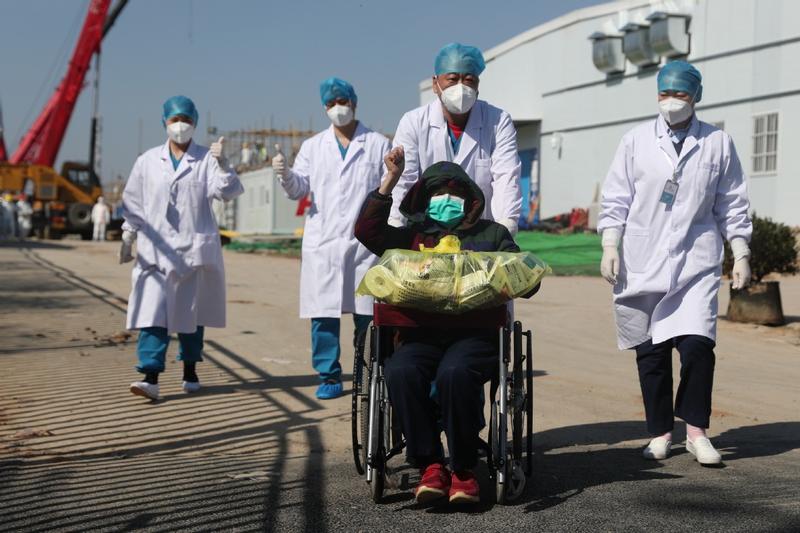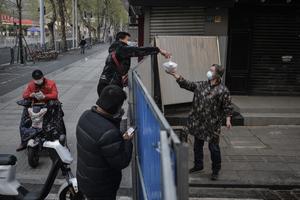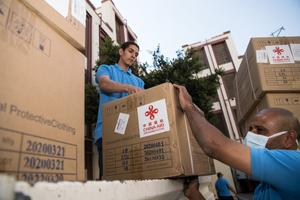Traditional culture playing a vital role
 An 83-year-old COVID-19 patient is the first to be discharged from Leishenshan Hospital in Wuhan, Hubei province, on Feb 18. (WANG JING / CHINA DAILY)
An 83-year-old COVID-19 patient is the first to be discharged from Leishenshan Hospital in Wuhan, Hubei province, on Feb 18. (WANG JING / CHINA DAILY)
The COVID-19 pandemic has largely been brought under control in China, with many scholars believing that traditional culture has played an important role in shaping people's response to it.
In February, after a field investigation to Wuhan, Hubei province, by the World Health Organization, assistant director-general Bruce Aylward said China had demonstrated phenomenal collective action and a cooperative spirit in fighting the virus.
"Behind every window in every skyscraper, there are people cooperating with this response," the Canadian epidemiologist said.
Speaking at a recent edition of Vision China organized by China Daily and Tsinghua University, Aylward said Chinese people's sense of social responsibility, which is embedded in the nation's culture, and their experiences in fighting the severe acute respiratory syndrome, or SARS, outbreak in 2003 are key elements of the country's efforts to tackle the virus.
David Gosset, founder of the Europe-China Forum, said "the cultural element is of the greatest importance" in such a unified and rapid response.
"In the Chinese context, it can be said that traditional values inspired by Confucianism... helped China in its battle against COVID-19," Gosset said.
"Culture has been underestimated by commentators, while it has arguably played the most important role in shaping global reactions to events.
"Less visible than economic dynamics or even political structures or processes, culture is nevertheless what determines the behavior of individuals."
Four factors in traditional philosophy-dayitong (great unification), jiaguo tonggou (family and state are the same), filial piety and tianxia (all under the heaven)-have influenced the country's response to the pandemic, according to scholars.
Mario Cavolo, a non-resident senior fellow at the Center for China and Globalization, said,"In a further examination of the values at the root of achievements (made in the fight against the pandemic), we find a historical source driving values, attitudes, and ultimately, our behavior.
"In Europe, for example, we find Judeo-Christian ethics and religions, while some countries prefer a more post-Modern Era neoliberal set of values," he said.
Gosset said,"As a major global crisis, this pandemic has revealed many aspects of our modernity, and certainly that the world is not culturally uniform. It has indeed to be understood as the juxtaposition of several different cultural contexts."
 Chinese medical supplies arrive in Jakarta, Indonesia, on March 26. (DU YU / XINHUA)
Chinese medical supplies arrive in Jakarta, Indonesia, on March 26. (DU YU / XINHUA)
Great unification
The Confucian concept of dayitong means a common pursuit or respect for unity. Traceable to Confucius, Mencius and other philosophers, it was elaborated on by the philosopher Dong Zhongshu (179-104 BC).
From the Han Dynasty (206 BC-AD 220) onward, ancient China saw its most prosperous period, in which the benefits of Confucian civilization were spread to the rest of the world.
Yu Zhiping, philosophy professor at Shanghai Jiao Tong University, said,"This influence can still be felt in China today, which is helping the Chinese people win the coronavirus war.
"The dayitong concept, which still influences Chinese political culture, has made such an unprecedented mobilization of nationwide resources possible."
Since a lockdown was enforced in Wuhan on Jan 23, unparalleled nationwide mobilization efforts have been made to combat the pandemic.
Two days later, under President Xi Jinping's command, a central leading group on epidemic response, headed by Premier Li Keqiang, was established. On Jan 27, a central working group led by Vice-Premier Sun Chunlan was sent to oversee work in Hubei.
On Feb 10, the National Health Commission launched an assistance plan, with 19 provinces providing support to cities in Hubei.
According to official data, some 43,000 medical workers risked their lives to help the province.
Two makeshift hospitals-Huoshenshan and Leishenshan, with a total capacity of 2,600 beds-were quickly built and started treating COVID-19 patients in early February.
Following the efforts made in Wuhan, most cities nationwide adopted strict measures to minimize the movement of people.
Canadian political science professor Daniel A. Bell said that with the experience gained in fighting SARS, Chinese people know that when social order faces a severe threat, a strong, collective and efficient government is needed to take decisive action.
Bell, dean of the School of Political Science and Public Administration at Shandong University and professor at Tsinghua University, made the comments in a recent interview with the website of the Communist Party of China's Central Commission for Discipline Inspection.
A global crisis perception index released last month by social research agency Blackbox Research and consumer intelligence platform Toluna supports Bell's assessment. It found that China had the highest-rated leadership among 23 nations, with the country scoring 85 points out of 100.
Conducted over 16 days from April 3, respondents were asked to rate their countries through four key indicators: national political leadership, corporate leadership, community and media.
 Volunteers check deliveries of pork ordered online in Wuhan on March 18. (YUAN ZHENG / FOR CHINA DAILY)
Volunteers check deliveries of pork ordered online in Wuhan on March 18. (YUAN ZHENG / FOR CHINA DAILY)
Families and nation
In addition to the whole-nation system, Bell highlighted the spirit of cooperation among Chinese people fighting the virus.
He said that in traditional Chinese culture, citizens feel obligated to serve their families and the nation.
Yu, from Shanghai Jiao Tong University, said this is the ideal of jiaguo tonggou, which means that family is a reduction of the state, and the state is an amplification of the family.
"In Chinese families, parents have the authority to make decisions and children should follow them," he said.
"In cultural terms, we take the country as our family, and when the government declared a war on the deadly pneumonia, millions of people from all walks of life, including civil servants, medics, community workers and volunteers, risked their lives to fight on the frontline."
By inheriting ancient wisdom, Chinese have a hardwired willingness to sacrifice individual freedom and undergo hardships for the sake of common well-being, Yu said.
"To lock down a huge city like Wuhan, with a population of over 11 million people, is unprecedented. With the support of the public and its willingness to comply with government orders, China succeeded."
Bell said that by sacrificing part of their freedom and privacy temporarily, people-with Confucian culture deep in their hearts-were willing to comply with the government's quarantine measures, because they trusted the authorities to make the best decisions.
When the Wuhan lockdown was imposed, all public transportation and business halted, with residents ordered to stay indoors to reduce transmission of the virus. The lockdown was lifted last month, with business in the city gradually returning to normal.
The concerted response to the measures taken in Wuhan bear testimony to a Chinese proverb that states, "When people are of one mind and heart, they can move Mount Tai." (The mountain is a landmark of cultural and historical significance north of Tai'an, Shandong province.)
Bell said that in times of crisis, "the collectivist orientation perspective has its benefits, compared with individual orientation".
As China fought the virus, non-governmental organizations and overseas Chinese donated urgently needed protective equipment, including face masks, surgical gowns and goggles, to support epidemic prevention and control measures.
Tens of thousands of manufacturers nationwide quickly reconfigured production lines to make medical masks to meet surging demand at home and overseas. The country's daily output of masks rose from 8 million on Jan 25 to 116 million on Feb 29.
Meanwhile, technology companies, including Alibaba and Tencent, have created apps to help the public cope with confinement.
Gosset, from the Europe-China Forum, said, "The effectiveness of Chinese governance, combined with a culture in which individuals put collective responsibility above all, can explain why China has been able to manage a highly dangerous situation."
 A Wuhan resident receives a food delivery during the lockdown. (HU DONGDONG / FOR CHINA DAILY)
A Wuhan resident receives a food delivery during the lockdown. (HU DONGDONG / FOR CHINA DAILY)
Filial piety
As the outbreak in China developed into a global pandemic, many countries encouraged the elderly and those with severe medical conditions to stay at home, as they faced a higher risk of contracting COVID-19.
With hospitals around the world unable to cope with a surge in the number of patients needing treatment for the disease, debate arose over whether medics should give priority to younger patients.
However, Bell said that in China-a country deeply influenced by Confucianism, with filial piety its core virtue-strong measures have been taken to protect seniors from the disease.
Filial piety, or xiao, means to respect, obey and care for the elderly, highlighted in ancient and authoritative classics such as The Analects of Confucius and The Classic of Filial Piety (Xiaojing), along with works by Mencius.
According to a frequently quoted saying by Mencius,"Treat all elders as you would respect your own; love all children as you would love your own."
Tang Bei, a professor specializing in global health governance at Shanghai International Studies University, said, "This virtue has been a constant theme in China's COVID-19 response, which includes all-out efforts to provide testing and treatment for all those in need, no matter whether they are young or old."
In the fight against the contagion, the Chinese leadership has continued to emphasize that people's lives, safety and health are the top priorities.
Tang said, "This is people-orientation, an important ethical requirement in the public health field, especially in making epidemic prevention and control policy."
China's response to the pandemic is largely shaped by its ancient philosophy of ethics, which has greatly increased people's trust in the government, the professor said.
Tang quoted from the Confucian classic The Book of Documents, or Shangshu, which states, "The people are the root of a country; when the root is firm, the country is tranquil."
As of April 6, the average total cost of treating a hospital patient with COVID-19 was 21,500 yuan (US$3,038).
For severe cases, the average minimum cost was 150,000 yuan, with the overall charges for treating some critical cases reaching more than 1 million yuan, according to the National Health Commission. All such expenses are covered by the country's healthcare insurance system and government budget.
Official data show that as of last month, Wuhan had registered more than 50,000 patients with the virus-about 2,500 of them age 80 or older. The oldest patient who recovered is 108.
 Workers transfer medical supplies from China in Cairo, Egypt, on May 10, 2020. (PHOTO / XINHUA)
Workers transfer medical supplies from China in Cairo, Egypt, on May 10, 2020. (PHOTO / XINHUA)
Global community
While taking good care of its citizens at home, China has offered help to nations severely affected by the pandemic.
The sudden emergence of the virus has served to remind the world that, in the era of globalization, all countries' interests are closely interconnected and society has a shared future.
The concept of a shared future is similar to the notion of tianxia (all under the heaven), which embodies a worldwide public perspective rooted in Confucian moral and political thinking.
In Liji (The Book of Rites), translated by the Scottish Sinologist James Legge, Confucius states, "When the grand course was pursued, a public common spirit ruled all under the heaven."
Cavolo, from the Center for China and Globalization, has lived in China for two decades and witnessed the country's fight against the pandemic in Shenyang, capital of Liaoning province.
The Italian-American, who remains deeply concerned for his family and relatives in the United States, said: "In essence, we are all connected. We are all part of the same glorious community, and each individually responsible for what we do to shape that community."
This community transcends ethnicity or sovereign borders, and in this sense, people are experiencing a unifying challenge as they face the pandemic," he said.
The Confucian vision of an ideal society envisioned a world characterized by harmony and cooperation, which President Xi has mentioned several times.
In 2015, Xi took the podium at the UN to speak of "a community with a shared future for mankind". He elaborated on this later, saying that an ideal world would be one that is safe, prosperous, open, orderly and inclusive.
On May 18, Xi announced at the virtual opening of the 73rd session of the World Health Assembly that China would provide US$2 billion over two years to help with the COVID-19 response and with economic and social development in countries affected by the virus, especially developing nations.
Xi also said China is ready to work with the international community to bolster support for the hardest-hit countries.
Igor Shatrov, deputy director of Russia's National Institute for the Development of Modern Ideology, told Xinhua News Agency the pandemic is a serious test in which "humanity must realize that we live in a single world and have a common destiny, so it should unite in the face of a global threat".
Contact the writers at wangqian@chinadaily.com.cn


